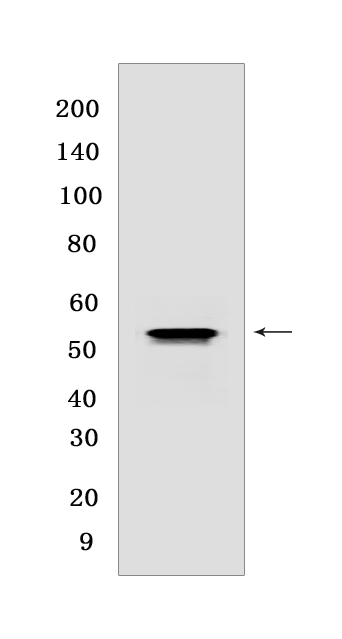SESN2/Sestrin-2 Rabbit mAb [G63O]Cat NO.: A22350
Western blot(SDS PAGE) analysis of extracts from HeLa cells.Using SESN2/Sestrin-2Rabbit mAb [G63O] at dilution of 1:1000 incubated at 4℃ over night.
Product information
Protein names :SESN2,Hi95,SEST2,SESN2_HUMAN,Sestrin-2
UniProtID :P58004
MASS(da) :54,494
MW(kDa) :54 kDa
Form :Liquid
Purification :Protein A purification
Host :Rabbit
Isotype :IgG
sensitivity :Endogenous
Reactivity :Human,Mouse,Rat
- ApplicationDilution
- 免疫印迹(WB)1:1000-2000
- 免疫荧光(ICC/IF) 1:100
- The optimal dilutions should be determined by the end user
Specificity :Antibody is produced by immunizing animals with a synthetic peptide at the sequence of human SESN2/Sestrin-2
Storage :Antibody store in 10 mM PBS, 0.5mg/ml BSA, 50% glycerol. Shipped at 4°C. Store at-20°C or -80°C. Products are valid for one natural year of receipt.Avoid repeated freeze / thaw cycles.
WB Positive detected :HeLa cells
Function : Functions as an intracellular leucine sensor that negatively regulates the TORC1 signaling pathway through the GATOR complex. In absence of leucine, binds the GATOR subcomplex GATOR2 and prevents TORC1 signaling (PubMed:18692468, PubMed:25263562, PubMed:25457612, PubMed:26449471, PubMed:26612684, PubMed:26586190, PubMed:31586034). Binding of leucine to SESN2 disrupts its interaction with GATOR2 thereby activating the TORC1 signaling pathway (PubMed:26449471, PubMed:26586190). This stress-inducible metabolic regulator also plays a role in protection against oxidative and genotoxic stresses. May negatively regulate protein translation in response to endoplasmic reticulum stress, via TORC1 (PubMed:24947615). May positively regulate the transcription by NFE2L2 of genes involved in the response to oxidative stress by facilitating the SQSTM1-mediated autophagic degradation of KEAP1 (PubMed:23274085). May also mediate TP53 inhibition of TORC1 signaling upon genotoxic stress (PubMed:18692468). Moreover, may prevent the accumulation of reactive oxygen species (ROS) through the alkylhydroperoxide reductase activity born by the N-terminal domain of the protein (PubMed:26612684). Was originally reported to contribute to oxidative stress resistance by reducing PRDX1 (PubMed:15105503). However, this could not be confirmed (PubMed:19113821)..
Tissue specificity :Widely expressed..
Subcellular locationi :Cytoplasm.
IMPORTANT: For western blots, incubate membrane with diluted primary antibody in 1% w/v BSA, 1X TBST at 4°C overnight.


